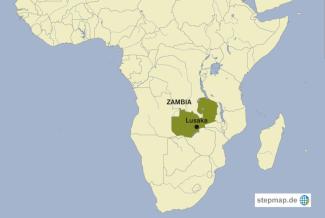Mobile phones
Ringing up sales

Along with gaining dominant market shares in Zambia, the Chinese firms – with brands such as Tecno, Itel and Infinix – are also fostering the growth of Zambian smartphone retailers and accessories suppliers, thus helping to build the economy.
Across Zambia, city and town centres are full of brightly coloured advertisements for Chinese smartphones. Scores of new retailers are springing up to meet the burgeoning demand.
“I started selling cell phones in 2016 with just a few handsets and a couple of accessories,” says retailer Obby Mbewe, owner of Mobile Tech, a shop in Lusaka’s sprawling town-centre market. “Back then I struggled to sell a single handset in a day. But thanks to the arrival of so many Chinese smartphones with advanced features, things have changed.”
“Infinix phones are selling like hotcakes,” says retailer Teddy Kunda. “I sell more of these phones per week than any other brand.” A glimpse into Kunda’s shop on Lusaka’s Chachacha Road reveals a wide range of brands, most of them Chinese.
In Zambia, low internet access costs and mobile-telephony innovations are driving the demand for smartphones. The success of Chinese smartphones in particular shows how the right product at the right price can create a big market even in a country with limited purchasing power.
Shenzhen-based Transsion Holdings, whose brands include Infinix, Tecno and Itel, is among the strongest Chinese contenders in the Zambian market. The firm sells phones only outside of China.
In Zambia, at least, Transsion is leaving global players like South Korea’s Samsung and the US giant Apple in the dust. According to International Data Corporation, the global provider of market intelligence for the IT industry, Transsion is among the top-selling mobile phone providers in Africa.
One clear success factor is the prices charged by Chinese manufacturers. While offering capabilities to rival those of international giants, Chinese smartphone brands such as Infinix Hot and Tecno Camon15 sell for between $ 50 and $ 200 depending on features.
Beyond modest prices, Chinese handset makers offer locally tailored features such as double-SIM card slots, which help users to avoid lapses in network coverage; longer battery life, to compensate for power black-outs; and sharp camera technology calibrated to darker skin tones.
The success of Chinese smartphones in Zambia provides an important lesson for local suppliers and retailers, says Lusaka-based financial analyst Maambo Hamaundu. “You can be a giant today and a small boy will overtake you tomorrow and become a giant,” he says. “Chinese firms are successful because they understand the market and can satisfy the needs of the market. Our local entrepreneurs should also seize every opportunity.”
Derrick Silimina is a freelance journalist based in Lusaka. He focuses on Zambian agriculture and sustainability issues.
derricksilimina@gmail.com








